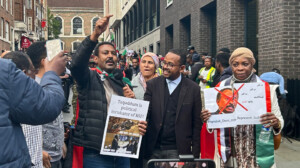Inflation continues to rise in Sudan
Inflation in Sudan has risen to 229.85 per cent in October, an increase of 17.56 per cent compared to September. Protesters closed the Africa Road in Khartoum on Monday in protest against the dire living conditions. In Port Sudan, mini-bus drivers demand higher transport tariffs.
 Protests against the dire living conditions in Khartoum on Monday (Social media)
Protests against the dire living conditions in Khartoum on Monday (Social media)
Inflation in Sudan has risen to 229.85 per cent in October, an increase of 17.56 per cent compared to September. Protesters closed the Africa Road in Khartoum on Monday in protest against the dire living conditions. In Port Sudan, mini-bus drivers demand higher transport tariffs.
The monthly Central Bureau of Statistics report issued yesterday shows that the core inflation (excluding the Food and Beverages Group) was 280.51 per cent in October, compared to 264.59 per cent in September. The inflation rate for the Food and Beverages Group was 194.54 per cent in October (175.6 per cent in September).
Inflation increased in 17 of Sudan’s 18 states. The highest rate, 351.33 per cent, was recorded in El Gezira. The lowest rate, 187.70 per cent, in Sennar. Prices remained stable in West Darfur.
Road closed
Protesters in El Sahafa and Arkoweet neighbourhoods in Khartoum closed the Africa Road near the airport (popularly called Airport Road) on Monday afternoon in protest against the deteriorating living conditions and the government’s plans to increase the price of bread.
The protesters carried banners rejecting the increased bread price. They demanded transparency from the government concerning its economic policies.
A member of the Resistance Committees active in Arkoweet told Radio Dabanga that they will reinforce their demands by blocking the entrances to all government offices in the district.
There have been protests across Sudan against high prices for bread and fuel for years. Prices have never been higher than now.
Transportation tariffs
In Port Sudan, capital of Red Sea state, amjad mini-bus drivers started a strike on Monday, demanding an adjustment of the new transportation tariffs issued by the authorities.
Journalist Osman Hashim told Radio Dabanga that there are huge crowds of people are waiting in vain for transport at mini-bus stops.
The amjad drivers said that the tariff set at SDG30 pounds is not compatible with the increased fuel prices. When the Sudanese government lifted the subsidies on fuel at the end of October, fuel prices increased with 400 per cent.
Radio Dabanga’s editorial independence means that we can continue to provide factual updates about political developments to Sudanese and international actors, educate people about how to avoid outbreaks of infectious diseases, and provide a window to the world for those in all corners of Sudan. Support Radio Dabanga for as little as €2.50, the equivalent of a cup of coffee.












 and then
and then